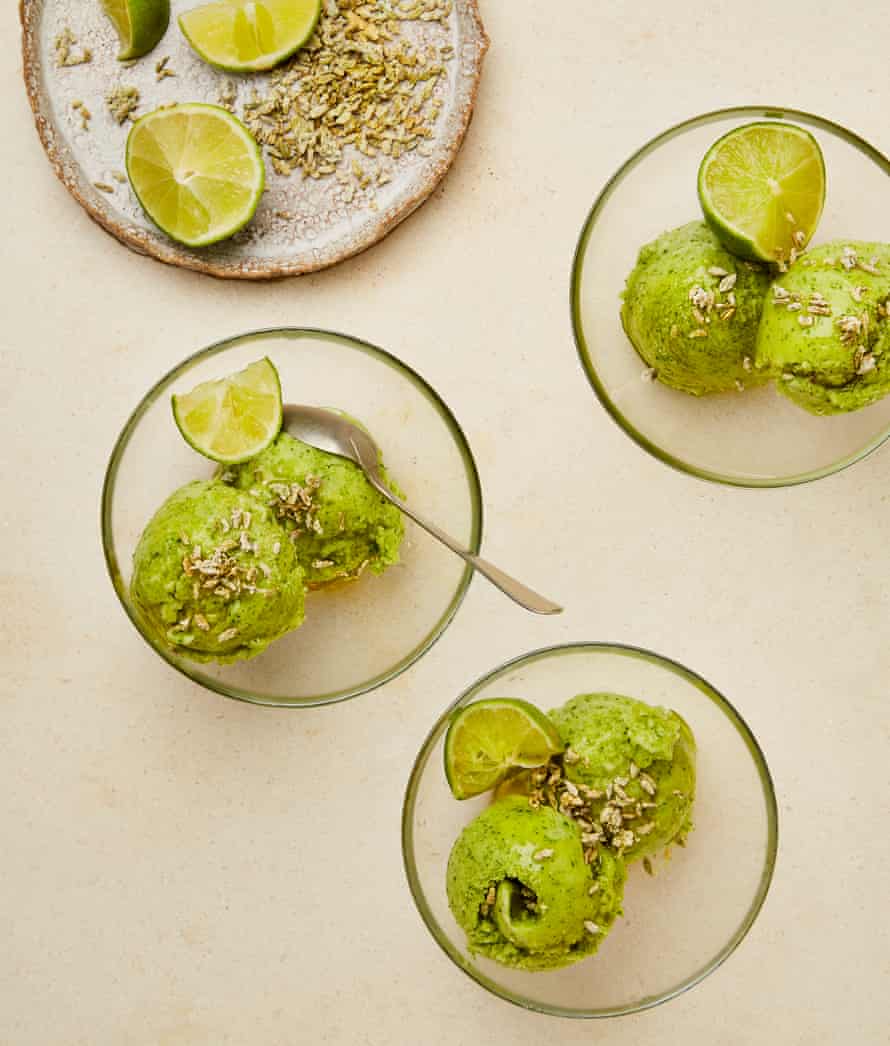
It’s not a plot-spoiler to say that I love herbs. Great big bunches of them make me happy and hungry, and I can’t imagine cooking without them. I love them fresh, as a pretty, tasty, final touch, I love them cooked and wilted in both sweet and savoury preparations, and I love them blitzed in dressings and smooshed into butter. In fact, I even slightly dream of writing a book about herbs, but then I remember that Mark Diacono and Caz Hildebrand have both already beaten me to it, with Herb: A Cook’s Companion and Herbarium, respectively. The use of herbs from plot to plate is a gift we all have within our reach.
Steamed sea bream with herby fenugreek butter and coconut salsa (pictured top)
Cooking fish en papillote is such an easy way to steam it perfectly: all the flavours get locked in, plus it’s fun to present the dish in its parcel. The butter is a nifty way to use up any old herbs in your fridge. It’ll make more than you need here, so tightly wrap any excess and freeze for up to three months – it’s great for garlic bread or on a roast chicken.
Prep 12 min
Cook 1 hr 25 min
Serves 4
For the herb butter
1 large garlic bulb, left whole, plus 2 cloves, peeled and crushed
2 tsp olive oil
Salt and black pepper
20g parsley, roughly chopped
20g coriander, roughly chopped
1 tbsp mint leaves, roughly chopped
½ tsp fenugreek seeds, finely ground in a mortar or spice grinder
½ tsp hot chilli flakes
1½ tsp lime zest
120g unsalted room temperature butter, cut into 1cm cubes
For the coconut salsa
25g coconut flakes (aka coconut chips)
1 tsp icing sugar
1 tsp lime juice
For the parcels
250g cherry tomatoes
1 large stick lemongrass, trimmed and finely sliced
20g ginger, peeled and finely grated
200ml full-fat coconut milk
8 stalks Tenderstem broccoli (120g), thicker stems cut in half lengthways
4 sea bream fillets (or other delicate white fish), skin on
1 red chilli, cut into thin rounds
2 tbsp parsley leaves
1 tbsp coriander leaves
1 tbsp mint leaves
1 tsp lime juice
Heat the oven to 240C (220C fan)/475F/gas 9. Cut off and discard the very top of the garlic bulb to reveal the cloves. Put the garlic cut side up on a small square of tinfoil, pour over the oil and sprinkle with a pinch of salt. Wrap the foil tightly around the garlic bulb and roast for 20 minutes, until softened. Remove and leave to cool, then squeeze out the flesh from the papery skins; discard the skins.
Turn down the oven to 180C (160C fan)/350F/gas 4. To make the butter, put the parsley, coriander, mint, roast garlic flesh and raw, crushed garlic in a food processor with a quarter-teaspoon of salt and blitz until finely chopped. Add the fenugreek, chilli flakes, lime zest and butter, blitz for a minute until smooth, then scrape into a bowl.
For the salsa, mix the coconut, sugar and lime juice in a bowl, then spread out evenly on a small baking tray lined with greaseproof paper. Toast in the oven for six minutes, stirring the mix once halfway through, until lightly caramelised, then remove and leave to cool.
Turn up the oven temperature to 220C (200C)/425F/gas 7. While it’s coming up to heat, set a large frying pan on a high heat and, once it’s hot, char the tomatoes, turning them every now and then, for five minutes, then transfer to a plate.
Cut out four 30cm squares of baking paper. Combine the lemongrass, grated ginger and coconut milk in a small bowl, crinkle up the baking paper squares into bowl shapes and divide the lemongrass mix between them. Divide the charred tomatoes and broccoli between the parcels, then lay a fish fillet skin side down on top. Sprinkle each portion with an eighth of a teaspoon of salt and a good grind of pepper and, using a spoon, spread 20g of the herb butter all over each fillet. Bring up the edges of the parcel over the fish, then securely seal by crimping the edges together.
Put the parcels on a large oven tray and bake for 12 minutes. Meanwhile, mix the fresh chilli, remaining herbs, lime juice and toasted coconut mixturein a small bowl. Divide the parcels between four shallow bowls, snip each one open at the top with scissors, spoon the salsa on top and serve hot.
Coconut and tahini green goddess with sunflower seed dukkah
This is a great way to use up excess herbs, so substitute with whatever you have to hand. The sunflower seed dukkah is so addictive, you’ll want to sprinkle it on everything. If you like, make double the amount and store the excess in an airtight jar, where it will keep for up to two weeks.
Prep 20 min
Cook 15 min
Serves 6
For the dressing
140ml full-fat coconut milk
75ml olive oil
10g mint leaves
35g chives, finely chopped
20g parsley leaves
1 garlic clove, peeled and crushed
2 tbsp tahini
3 tbsp lime juice (from 1-2 limes)
½ tsp maple syrup
Flaked salt
For the dukkah
50g sunflower seeds
1½ tsp urfa chilli flakes
1½ tsp aleppo chilli flakes
⅛ tsp ground turmeric
⅛ tsp kashmiri chilli powder, or paprika
¼ tsp caster sugar
For the salad
1 small white chicory, leaves separated (60g)
1 small red chicory, leaves separated (60g)
1 baby gem lettuce, leaves separated
1 small lebanese cucumber, cut into 6cm-long batons (or ½ regular cucumber, watery seeds removed, flesh cut into 6cm-long batons)
100g rainbow (or regular) radishes, leaves left on, cut in half lengthways
Put the coconut milk in a small saucepan on a medium heat, warm gently for two to three minutes, until steaming (this will prevent it from splitting when blitzed). Take off the heat, stir in a tablespoon of water and leave to cool.
Once the coconut milk is cool, put it in a blender with 60ml olive oil, the herbs and garlic, and blitz for two to three minutes, until smooth. Pour into a bowl and stir in the tahini, lime juice, maple syrup and three-quarters of a teaspoon of flaked salt.
For the dukkah, partially crack the sunflower seeds in a mortar, giving them two or three turns with the pestle, then tip into a small bowl. Put all the remaining dukkah ingredients in the mortar, roughly crush, then tip into the sunflower seed bowl and mix.
To assemble, arrange the leaves, cucumber and radishes artfully on a platter. Drizzle over the remaining tablespoon of oil and sprinkle over a quarter-teaspoon of flaked salt and a handful of the dukkah. Serve the green goddess dressing and remaining dukkah in bowls alongside for dipping.
Pineapple and herb sorbet with candied fennel seeds

The secret to keeping this sorbet a vibrant, herby green is to semi-freeze the pineapple first and churn itwhile it’s nice and cold. The candied fennel seeds are optional and will make more than you need here; keep any extra to snack on or to sprinkle on desserts. You’ll need an ice-cream machine for this.
Prep 10 min
Freeze 3 hr 30 min+
Cook 30 min
Serves 6
1 large ripe pineapple (or 2 smaller ones)
15g basil leaves
15g mint leaves
5g parsley leaves
150g glucose syrup
50g caster sugar
3 limes – 1 juiced, to get 1 tbsp, the rest cut into 6 wedges each, to serve
3 tbsp good-quality extra virgin olive oil, to serve
For the candied fennel seeds (optional)
30g caster sugar
20g fennel seeds
Top and tail the pineapple, then cut off and discard the skin and eyes. Cut around the core (use a pineapple corer, if you have one) and discard it, then cut the flesh into 3cm chunks. Weigh out 600g (snack on anything you have over that), spread out on a small, freezer-proof tray and freeze for an hour and a half to two hours (by that time, the chunks won’t be quite frozen all the way through).
Get ready your ice-cream machine. Put the herbs, glucose, sugar, two tablespoons of water, lime juice and frozen pineapple in a blender and blitz, stopping every now and then to stir, if need be, until very smooth and with no bits. This should take about five minutes in total (or less if you have a very powerful blender).
When the ice-cream machine is ready, pour in the cold pineapple mixture, churn it to the consistency of soft-serve, then transfer to an air-tight container and freeze for at least two hours.
Meanwhile, make the candied fennel, if using. Put 25ml water and the sugar in a small saucepan on a medium-high heat. Stir to dissolve, then bring to a boil and cook, stirring often, for exactly two minutes – the syrup should bubble very vigorously and make large bubbles, but not start to colour at all. At the two-minute mark, turn down the heat to medium-low, add the fennel seeds and stir for 90 seconds to three minutes, until they’re – they will start to dry out, turn white and get coated in a white, sandy mixture. Don’t take the mix beyond this point, or the sugar will darken and caramelise, which you don’t want. Remove the pan from the heat, stir to separate the seeds as much as possible, then tip on to a small tray or plate and leave to cool.
To serve, divide the sorbet between six bowls, squeeze over a lime wedge, drizzle each portion with a teaspoon and a half of good olive oil and top with a sprinkling of the fennel seeds.



